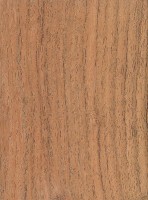 |
Common Name(s): Honey Mesquite Scientific Name: Prosopis glandulosa Distribution: Southwestern North America Tree Size: 20-30 ft (6-9 m) tall, 8-16 in (20-40 cm) trunk diameter Average Dried Weight: 51 lbs/ft3 (820 kg/m3) Specific Gravity (Basic, 12% MC): .70, .82 Janka Hardness: 2,340 lbf (10,410 N) Modulus of Rupture: No data available* Elastic Modulus: No data available* Crushing Strength: No data available* *Strength properties most likely very similar to Prosopis juliflora Shrinkage: Radial: 1.6%, Tangential: 3.2%, Volumetric: 4.8%, T/R Ratio: 2.0 |
Color/Appearance: Heartwood tends to be a reddish brown, which darkens with age. Sapwood is yellow in color, and tends to be thin.
Grain/Texture: Honey Mesquite has a medium to coarse texture and open pores, with a slight natural luster. Clear portions of the trunk tend to have straight or wavy grain: though knots, defects, and other irregularities are common.
Endgrain: Diffuse-porous (or semi-ring-porous); large pores in no specific arrangement, few to moderately numerous; solitary and radial multiples of 2-3; amber-colored deposits occasionally present; growth rings indistinct (or distinct due to marginal parenchyma); medium to large rays may be just barely visible without lens, normal spacing; parenchyma vasicentric, lozenge, and confluent.
Rot Resistance: Honey Mesquite is considered very durable regarding decay resistance.
Workability: Working properties are largely dictated by the quality of the wood itself. Mesquite that is clear and free from defects is easy to work with hand and machine tools, but irregular grain or knots can be challenging. Glues, turns, and finishes well.
Odor: No characteristic odor.
Allergies/Toxicity: Woods in the Prosopis genus have been reported to cause skin irritation. See the articles Wood Allergies and Toxicity and Wood Dust Safety for more information.
Pricing/Availability: Mesquite only tends to be available in small sizes, or as large irregular slabs. Larger boards free from defects are uncommon. Prices for Honey Mesquite are in the upper range for a domestic hardwood.
Sustainability: This wood species is not listed in the CITES Appendices or on the IUCN Red List of Threatened Species.
Common Uses: Fence posts, flooring, turned objects, cabinetry, and furniture.
Comments: Considered by some to be an invasive species, Mesquite is known to produce great firewood with a high thermal value. Honey Mesquite is prized by segmented woodturners and others for its exceptional stability. Honey Mesquite exhibits very little movement or expansion/contraction due to environmental changes in humidity.
 |
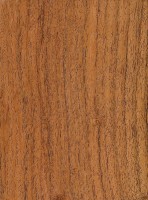 |
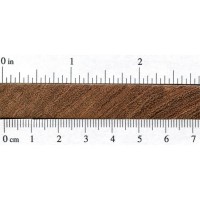 |
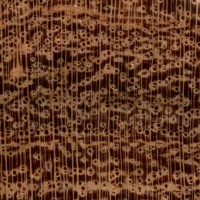 |


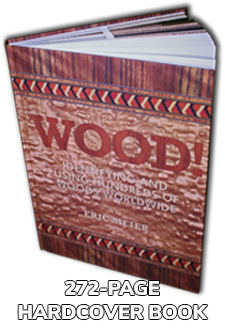

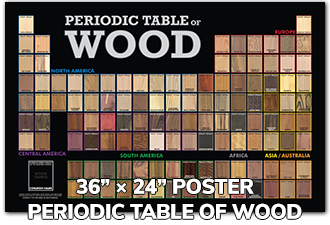
My brother had a couple of small bore varmint rifles with mesquite stocks, and I hope to inherit one of them. The hardness and wether stability must be advantages, but they have an impermeable varnish or lacquer finish to further reduce expansion and shrinking.
Very distinct floral Aroma when cutting. Shatters frequently when impacted. Not good for impact tool handles.
Pretty awful allergic reactions! From what I can tell, both Honey and Velvet mesquite are SENSITIZERS. Many guys at mesquite mills including myself have developed gnarly physical reactions to the dust. For example I was left with a massive headache, cough, and fever after a full day sanding mesquite. I was using skin covering protection and a quality dust mask. I’ve noticed mild reactions over the years but this last one was the turning point for me… I also dont recommend the wood for anything culinary, as the surface wood can still be toxic due to the oils/tannins present. Too… Read more »
Right. My wife took I’ll for two weeks from being near me while I was sanding. I quit using it. Sinus improved.
I was looking for the modulus of elasticity of mesquite and there is none listed. I was hoping to develop a mental baseline for elasticity using mesquite as one end of the scale. Mesquite is possibly the most brittle wood that I have worked with. When cutting firewood I am just as likely to break it into small pieces as I am to cut it with a saw. Made the mistake of carving a wooden mallet from mesquite and even tried a hammer handle. Fail.
I have a question on tannins? I have been working on this project of mine now almost a month. I would get black discoloration in my hands mighty after working some in it. I attributed that to the hide glue I’ve been using. That would remain on my hands and then picking up dirt as it would usually wash off except for tiny bits at the end of the night. Well I am a couple days from working with any sections where any left over glue would be touched let alone any that was still sticky and last night and… Read more »
I think this has happened to me as well. I get what looks like patches of tiny, black freckles on my hands that refuse to wash off with soap and hot water. I often have to use acetone to get my hands clean after working with mesquite(some pieces of black walnut have done the same). I absolutely love honey mesquite as a material and use it as often as I can due to its beauty, but the staining is rather annoying.
This happens to me always. Really bad. Apparently does not affect my health or give lasting a rash or anything on my skin.
Take some lemon juice in your palm and wash with it. The stain will be gone in a minute or less.
I believe the allergic reactions are a little understated for Mesquite. Many pollen and allergy sites claim mesquite is a major offender of causing asthma type reactions, inflamed nasal passages, etc. I can personally say that I have worked with all types of wood commercially available and otherwise in Phoenix. Only mesquite causes me an allergic reaction. Tighten chest, difficulty breathing, stuffed nose, etc. It is unbearable and lasts a whole day plus.
It is also a very popular wood for bbq and grilling in Texas.
These pictures don’t do Honey
Mesquite justice. It is an extremely beautiful wood with wild and
unpredictable grain patterns. It’s very hard and stable. Visit my
website to see some of the beauty of this hidden treasure. https://www.MesquiteTREE.org
I like your website! I think it’s better form not to overtly advertise (as opposed to contributing your and your husband’s considerable expertise). I know it’s five years ago, but still.
That said, would you consider this a good wood for making a custom folding rule? The wood needs to be strong and dimensionally stable, but the pieces are only about 12″ x 3/8″ x 5/8″ so you don’t need long stretches of straight grain.
The trick is the straight grain. The trunks on mesquite tend to twist a lot. You’ll probably have better luck with straight grain from big branches, especially for those short runs. And since it’s such a stable wood you won’t have worry much about normal branch issues.
Try one of the mesquite flooring places in Texas. I purchased a couple pieces of quartersawn 4/4 pieces and currently using them to build a guitar from. I have yet to use a wood so stable. Granted I was using pieces that were to be used as flooring material but I am enjoying using it.
What do you know about the differences between the species of glandulosa and julifora in the Prosopis genus??.
I don’t know about the wood, but the trees themselves are different in the fact that honey mesquite has approximately 1 inch thorns on it
I’d say more like 3″ thorns (or impaling spikes as I call them) occasionally if I happen to be walking along after cutting some down and happen to step on a piece and the “spike” easily pierces my work boot and goes into my foot I can be heard to exclaim “Oh Golly” at the top of my voice. Yes I agree Mesquite is a beautiful wood but that tree is very mean. I strongly suggest that you not piss them off for they will follow you home and meanness & intimidate you! If you work cutting down the Mesquite… Read more »
I used this wood to turn a bowl and it is very hard! Good dense wood but if you turn it, plan on sharpening a few times. Beautiful wood though and polishes up nice.
These pictures don’t do Honey Mesquite justice. It is an extremely beautiful wood with wild and unpredictable grain patterns. It’s very hard and stable. Visit my website to see some of the beauty of this hidden treasure. https://www.MesquiteTREE.org
Anyone who has worked with mesquite and took the time to sniff it knows that it does have a certain smell to it. I can’t really describe it but I would know it if I smelled it.
Smells like Popcorn! It’s a member of the legume family, and the smell is similar to peanuts.
Wow, that’s exactly it. I could t place it.
Side note: This tree is almost impossible to eradicate once it had developed a root. You can cut it down past ground surface and by the next year it will have sent up a shoot that sits there intimidating you.
Yes, we have found that it is necessary to remove the stump. Very tenacious.
I think that I am cutting velvet mesquite mostly and I get a sweet perfumy smell from it. Definitly not popcorn here. Sonoran desert near Tuscon.